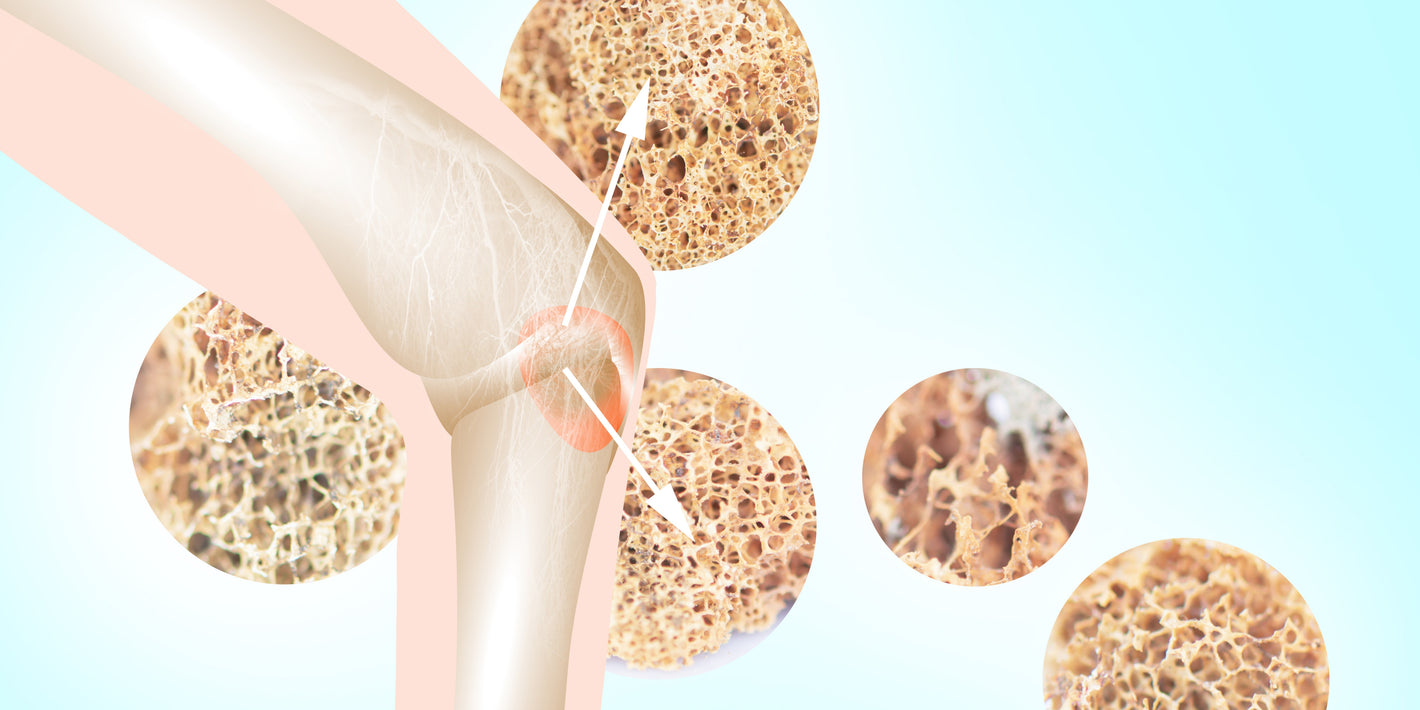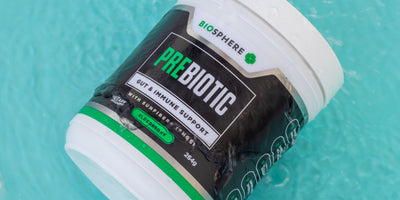
Prebiotics and Bone Density: Enhancing Calcium Absorption Naturally
Maintaining strong and healthy bones is crucial for overall well-being and quality of life, particularly as we age. Calcium is widely recognised as an essential nutrient for bone health, but recent research has underscored the importance of prebiotics in optimising calcium absorption. This article explores how prebiotics can naturally boost bone density by enhancing calcium absorption, providing a comprehensive look at the science and practical steps for incorporating prebiotics into your diet.
Introduction to Prebiotics and Bone Health
Prebiotics are non-digestible fibres that feed beneficial gut bacteria. Unlike probiotics, which are live bacteria, prebiotics promote the growth and activity of these beneficial microorganisms. The connection between gut and bone health might not seem obvious initially, but it is profound. The gut is critical in nutrient absorption, including calcium, for maintaining strong bones. Prebiotics can improve the body's calcium absorption by enhancing gut health, thereby contributing to better bone density.
A growing body of research supports the relationship between prebiotics and bone health. Studies have shown that prebiotics can increase the bioavailability of calcium, making it easier for the body to absorb and utilise this essential mineral. This is particularly important because our ability to absorb calcium decreases as we age, leading to a higher risk of bone-related issues such as osteoporosis. By improving calcium absorption, prebiotics offer a natural way to support bone health throughout life.
Moreover, prebiotics can broadly impact overall health, indirectly benefiting bone density. A healthy gut microbiome is associated with improved immune function, reduced inflammation, and better overall nutrient absorption. All these factors contribute to maintaining strong and healthy bones. Therefore, incorporating prebiotics into your diet not only supports bone health directly but also enhances general well-being.
Mechanisms of Prebiotics in Enhancing Calcium Absorption

The gut microbiome, comprising multiple microorganisms, is vital in health and disease. Prebiotics, such as inulin, fructooligosaccharides (FOS), and galactooligosaccharides (GOS), stimulate beneficial gut bacteria growth. These bacteria ferment prebiotics to produce short-chain fatty acids (SCFAs), including acetate, propionate, and butyrate. SCFAs have several health benefits, one of which is lowering the pH in the colon. A lower pH environment enhances the solubility of calcium, making it easier for the body to absorb this crucial mineral.
Additionally, SCFAs promote the expression of calcium-binding proteins in the intestines. These proteins play a critical role in the active transport of calcium across the intestinal lining into the bloodstream. By increasing the availability of calcium-binding proteins, prebiotics help maximise the amount of calcium absorbed from the diet. This mechanism mainly benefits individuals with lower dietary calcium intake or reduced calcium absorption capacity.
Furthermore, prebiotics can enhance the gut barrier function, preventing the leakage of harmful substances into the bloodstream. A robust gut barrier supports overall nutrient absorption and reduces inflammation, which can negatively impact bone health. Prebiotics indirectly support better bone health through improved nutrient uptake and reduced systemic inflammation by promoting a healthy gut environment.
Types of Prebiotics Beneficial for Bone Density
Several prebiotics have been identified for their potential to enhance calcium absorption and support bone health. Inulin, a soluble fibre in plants like chicory root, garlic, and onions, is one of the most well-studied prebiotics. Research has shown that inulin can significantly improve calcium absorption, particularly in the lower intestine, where most calcium absorption occurs. Inulin's ability to ferment and produce SCFAs makes it particularly effective in enhancing calcium solubility and uptake.
Fructooligosaccharides (FOS) are another group of prebiotics that have been shown to benefit bone health. FOS are naturally found in foods like bananas, leeks, and asparagus. They promote the growth of beneficial bacteria, such as Bifidobacteria and Lactobacilli, which contribute to a healthier gut microbiome. By improving the gut environment, FOS enhance the body's ability to absorb calcium, supporting stronger bones.
Galactooligosaccharides (GOS), present in beans, lentils, and particular dairy products, also play a crucial role in bone health. GOS have been linked to improved gut health and enhanced calcium absorption. They stimulate the growth of beneficial gut bacteria and promote the production of SCFAs, creating an optimal environment for calcium uptake. Including various prebiotic-rich foods can help ensure you receive the full benefits these fibres offer.
Impact of Prebiotics on Bone Density in Different Age Groups
The benefits of prebiotics for bone health are evident across different age groups, highlighting their importance throughout the lifespan. Prebiotics can support optimal bone development during critical growth periods in children and adolescents. During these times, the demand for calcium is high, and maximising calcium absorption is essential for building strong bones. Prebiotics can help children and adolescents get the most out of their dietary calcium, supporting healthy bone growth and development.
Maintaining bone density is crucial for adults to prevent conditions such as osteoporosis. As we age, bone remodelling slows down, and the balance between bone formation and resorption can be disrupted, leading to a gradual loss of bone density. Prebiotics can help sustain adequate calcium levels by improving calcium absorption, promoting bone strength, and reducing the risk of osteoporosis and fractures. Including prebiotics in the diet can be a simple and effective strategy for maintaining bone health in adulthood.
The elderly are at increased risk of bone-related issues due to reduced calcium absorption and age-related bone loss. Prebiotics can play a vital role in counteracting these effects by enhancing calcium uptake. Studies have shown that prebiotic supplementation can improve bone mineral density in postmenopausal women, a group particularly vulnerable to osteoporosis. By improving gut health and calcium absorption, prebiotics offer a natural way to support bone health in older adults and reduce the risk of fractures and other bone-related issues.
Clinical Studies on Prebiotics and Bone Health
Numerous clinical studies have demonstrated the positive effects of prebiotics on bone health. For example, a study published in the "Journal of Nutrition" found that women who consumed inulin experienced a significant increase in calcium absorption. The study highlighted that inulin supplementation not only improved calcium uptake but also had a lasting impact on bone mineral density. These findings suggest that incorporating prebiotics like inulin into the diet can have long-term benefits for bone health.
Another study published in "Osteoporosis International" reported that prebiotic supplementation improved bone mineral density in postmenopausal women. This study emphasised the potential of prebiotics to counteract age-related bone loss and reduce the risk of osteoporosis. The researchers found that women who consumed prebiotics had better calcium absorption and higher bone mineral density than those who did not, highlighting the importance of prebiotics in supporting bone health during menopause.
Furthermore, research published in "The American Journal of Clinical Nutrition" demonstrated that prebiotics like FOS and GOS could enhance calcium absorption in adolescents. The study showed that teenagers who consumed prebiotics had higher calcium absorption rates and improved bone mineral density. These findings are significant because adolescence is a critical period for bone development, and maximising calcium absorption during this time can have lasting benefits for bone health.
Dietary Sources of Prebiotics for Bone Health
Incorporating prebiotic-rich foods into your diet is a practical and effective way to support bone health. Chicory root is one of the richest sources of inulin, a prebiotic fibre known for enhancing calcium absorption. Chicory root can be consumed in various forms, including as a coffee substitute or added to salads and soups. Including chicory root in your diet can significantly boost your prebiotic intake.
Garlic and onions are also excellent sources of inulin and FOS. These versatile vegetables can be easily incorporated into various dishes, adding flavour and health benefits. Consuming garlic and onions regularly can help promote a healthy gut microbiome and improve calcium absorption. These vegetables offer other health benefits, such as supporting cardiovascular health and boosting the immune system.
Bananas are a convenient and tasty source of FOS. They can be eaten independently as a snack or added to smoothies, yogurt, or cereal. Asparagus and leeks are other vegetables rich in FOS that can be included in your diet. These vegetables can be roasted, steamed, or added to soups and salads, providing a delicious way to boost your prebiotic intake. Beans and lentils, high in GOS, can be incorporated into various dishes, such as soups, stews, and salads, offering a nutritious and fibre-rich addition to your meals.
Prebiotics vs. Probiotics: Their Roles in Bone Health
While prebiotics and probiotics play crucial roles in maintaining gut health, their mechanisms and effects on bone health differ. Probiotics are live bacteria that add to the population of beneficial microbes in the gut, whereas prebiotics are non-digestible fibres that nourish these bacteria. Together, they create a balanced and healthy gut microbiome, including calcium, essential for optimal nutrient absorption.
Probiotics can help maintain a healthy balance of gut bacteria, preventing the overgrowth of harmful microbes. This balance is crucial for overall gut health and efficient nutrient absorption. By supporting a healthy gut microbiome, probiotics indirectly contribute to bone health. However, without sufficient prebiotics, the beneficial bacteria in the gut may not thrive, reducing the effectiveness of probiotics. Therefore, combining prebiotics and probiotics can synergistically enhance overall gut health and calcium absorption.
Prebiotics, conversely, directly impact calcium absorption by promoting the growth of beneficial bacteria and the production of SCFAs. These SCFAs create an optimal environment for calcium solubility and uptake. By enhancing gut health, prebiotics support better calcium absorption and bone health. Incorporating prebiotics and probiotics into your diet can ensure a balanced and healthy gut microbiome, providing comprehensive support for bone health.
Supplementing with Prebiotics for Better Bone Health
Supplements can be a practical option if getting enough prebiotics from food alone is challenging. Prebiotic supplements come in various forms, including powders, capsules, and chewable tablets. When choosing a prebiotic supplement, look for inulin, FOS, or GOS products, as these are the most well-studied and effective prebiotics for enhancing calcium absorption.
It's essential to follow the recommended dosage on the supplement packaging and consult with a healthcare provider before starting any new supplement, especially if you have underlying health conditions or are taking other medications. Your healthcare provider can help determine the appropriate dosage and ensure the supplement will not interact with existing treatments.
In addition to prebiotic supplements, consider combining them with other bone-supporting nutrients such as calcium, vitamin D, magnesium, and vitamin K2. These nutrients work synergistically with prebiotics to support optimal bone health. Calcium supplements can help ensure you get enough of this essential mineral, while vitamin D enhances calcium absorption. Magnesium and vitamin K2 are crucial in bone formation and calcium utilisation, making them valuable additions to a bone health regimen.
Combining Prebiotics with Other Nutrients for Optimal Bone Health
Prebiotics work best when combined with other nutrients that support bone health. Vitamin D is essential for calcium absorption and bone health. It can be obtained from sunlight exposure, fatty fish, and fortified foods. Vitamin D helps the body absorb calcium from the diet and plays a critical role in bone mineralisation. Without adequate vitamin D, even if you consume enough calcium, your body may not absorb it efficiently.
Magnesium is another essential nutrient for bone health. It is in leafy greens, nuts, seeds, and whole grains. Magnesium helps convert vitamin D into active form, enhancing calcium absorption. Additionally, magnesium is a component of the bone mineral matrix, making it crucial for maintaining bone strength and density. Including magnesium-rich foods in your diet can support overall bone health and enhance the benefits of prebiotics.
Vitamin K2, present in fermented foods and certain cheeses, helps direct calcium to the bones and away from soft tissues. This vitamin activates proteins that bind calcium to the bone matrix, ensuring calcium is deposited where needed most. Without adequate vitamin K2, calcium can accumulate in soft tissues, leading to conditions such as arterial calcification. Combining prebiotics with vitamin K2 can help ensure that the calcium you absorb is effectively utilised for bone health.
Future Directions in Prebiotic Research for Bone Health
The field of prebiotic research is continually evolving, with promising directions for the future. Emerging studies explore the potential of personalised prebiotic therapies tailored to individual gut microbiomes. Personalised nutrition approaches consider individual variations in gut microbiota, dietary preferences, and health conditions. By tailoring prebiotic interventions to individual needs, researchers aim to maximise the benefits of prebiotics for bone health and overall well-being.
Additionally, researchers are investigating new prebiotic compounds and their unique effects on calcium absorption and bone health. Novel prebiotics derived from different sources, such as seaweeds and mushrooms, are being studied for their potential to support gut health and enhance nutrient absorption. These new compounds may offer additional benefits and provide more options for incorporating prebiotics into the diet.
As our understanding of the gut-bone axis deepens, we can expect more innovative strategies to enhance bone density naturally. Future research may also explore the interactions between prebiotics, probiotics, and other dietary components, providing a more comprehensive approach to bone health. By continuing to investigate the mechanisms and effects of prebiotics, researchers can develop evidence-based recommendations for improving bone health through diet and supplementation.
Summary
Introduction to Prebiotics and Bone Health:
- Prebiotics are non-digestible fibres that promote beneficial gut bacteria growth.
- Enhancing gut health with prebiotics improves calcium absorption, which is crucial for bone density.
- Prebiotics support overall health, indirectly benefiting bone health.
- Prebiotics stimulate beneficial bacteria to produce short-chain fatty acids (SCFAs).
- SCFAs lower colon pH, increasing calcium solubility and absorption.
- Prebiotics promote calcium-binding proteins, aiding in calcium uptake.
- Inulin: Found in chicory root, garlic, and onions; improves calcium absorption in the lower intestine.
- Fructooligosaccharides (FOS): Found in bananas, leeks, and asparagus, FOS enhances the growth of beneficial gut bacteria.
- Galactooligosaccharides (GOS): Found in beans, lentils, and dairy; linked to better gut health and calcium absorption.
- Children and Adolescents: Support optimal bone development during growth spurts.
- Adults: Maintain bone density to prevent osteoporosis and fractures.
- Elderly: Counteract age-related calcium absorption decline, reducing fracture risk.
- Journal of Nutrition: Inulin increases women's calcium absorption and bone mineral density.
- Osteoporosis International: Prebiotics improve bone density in postmenopausal women.
- American Journal of Clinical Nutrition: FOS and GOS enhance calcium absorption in adolescents.
- Chicory Root: Rich in inulin, it can be added to salads and soups.
- Garlic and Onions: High in inulin and FOS, versatile in various dishes.
- Bananas, Asparagus, and Leeks: Convenient sources of FOS.
- Beans and Lentils: High in GOS, nutritious additions to meals.
- Probiotics: Add beneficial bacteria to the gut and support overall gut health.
- Prebiotics: Nourish beneficial bacteria directly impact calcium absorption.
- Combining both provides synergistic effects for optimal gut and bone health.
- Prebiotic supplements (inulin, FOS, GOS) can be practical if dietary intake is insufficient.
- Consult with healthcare providers for appropriate dosage and safety.
- Combine prebiotics with calcium, vitamin D, magnesium, and vitamin K2 for optimal bone health.
- Vitamin D: Enhances calcium absorption, obtainable from sunlight and fortified foods.
- Magnesium: Converts vitamin D into its active form, found in leafy greens, nuts, and seeds.
- Vitamin K2 directs calcium to bones, which are present in fermented foods and certain cheeses.
- Personalised prebiotic therapies tailored to individual gut microbiomes.
- Exploration of new prebiotic compounds from diverse sources.
- Continued research on the gut-bone axis and synergistic interactions with other nutrients.
Prebiotic Information
For everything you need to know about prebiotics and prebiotic supplements, check out our comprehensive information page here.
Prebiotic
Biosphere Nutrition’s Prebiotic Powder is a unique blend of Sunfiber® and Black Elderberry Extract, designed to nurture gut health and support the immune system. This easy-to-mix, great-tasting formula ensures optimal absorption and digestive comfort. To learn more about our Prebiotic, check out the product page here.







